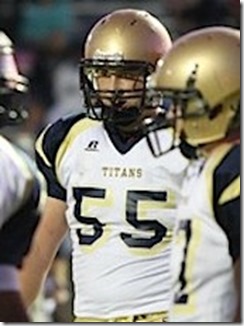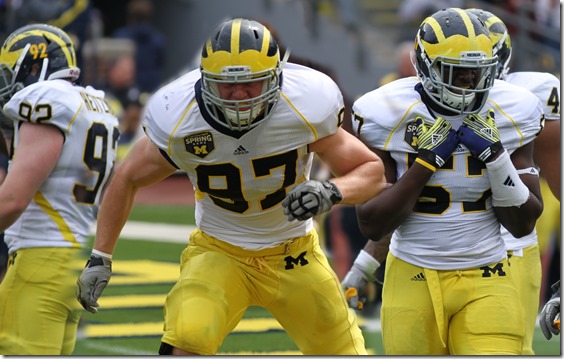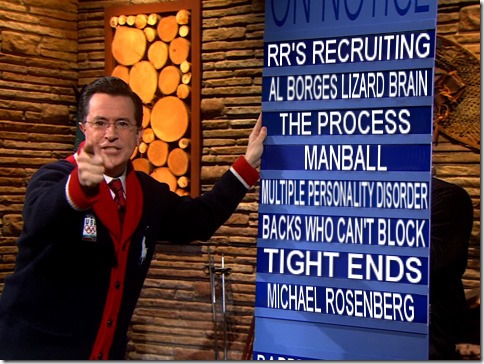al borges hates me
I realize Strobel got one. Find a better photo then, pickers of nits.
This has to be talked about. Hoke left a roster that was in relatively good shape considering all the highly rated players who had to stick through some awful program degradation. He signed good classes, and those classes have by and large stuck around and fulfilled their academic duties. But an inordinate amount of them inexplicably didn't redshirt, and because of this there are some holes on the horizon.
I'm sure there are explanations in many of these cases that we are not party to. It's only the sheer volume of head-scratching non-redshirts under Hoke that gives us reason to call all of them into question. Like how I'm sure there are legit medical hardship waivers that occur at Alabama but [graph].
Some guys the coaches were forced to play early, and there's no need to discuss them beyond a mention as such, e.g. Jabrill Peppers. Mason Cole outcompeted a pile of guys to start at left tackle last season. That sort of thing gets a full pass. Beyond that, I've broken each Hoke class into categories of increasing argh:
- WTF. Wasting redshirts on special teams and dime back when last year's dime back is on the bench.
- Pick ONE. Needed bodies at this position, but not all the bodies. Battles for 2nd on the depth chart should be resolved in time for the ultimate loser to have a 5th year as consolation.
- Need the dudes (and other things I don't blame on the coaches). Immediate starters or guys who played because Michigan sorely needed his body and his pulse at that position.
Names that should have redshirted are in red.
Class of 2011
Did you really need both, 2011? [Upchurch]
Hoke arrived to an offensive machine with two years of eligibility remaining, and a nightmare defense of guys who couldn't displace recent departures like Jonas Mouton, Ray Vinopal, Adam Patterson, Greg Banks, and James Rogers. The immediate need was obvious and Hoke rightfully set about recruiting freshmen who could fill those roles. So I'll give him a pass for some of it.
 |
| Hollowell's 2011 contribution was more than scooping up a fumbled kickoff against VT, but it was also more than Ray Taylor's. [Melanie Maxwell|AnnArbor.com] |
Wtf: None.
Pick ONE
Raymon Taylor and Delonte Hollowell. The year following the Never Forget defensive backfield, Hoke recruited five likely cornerbacks: Blake Countess, Raymon Taylor, Delonte Hollowell, Tamani Carter (redshirted, transferred before 2012), and Greg Brown (early enrollee, transferred before 2011 season). The roster still had J.T. Floyd, Courtney Avery and Terrence Talbott (left program summer before 2012 season), available. In a pinch, Troy Woolfolk could have converted back when Thomas Gordon won the free safety job. At least one, and probably two true freshmen would have to play.
It immediately became apparent that one would be Countess. So to fill out the two deep they would need to burn Taylor or Hollowell's shirt. Hollowell arrived as the quintessential Cass Tech mite corner. The guy was 164 pounds, but saw some action at dime back vs. Nebraska, and recovered the fumble at the end of the first half. Taylor had two tackles and a personal foul.
Brennen Beyer and Frank Clark. Going into the season Beyer was a SAM and Clark a WDE. The difference between those positions in Michigan's 4-3 under was not very great, particularly because when Beyer was inserted it was for a 5-2 look. The WDE's depth chart was Craig Roh and Jibreel Black; SAM was Jake Ryan and Cam Gordon. The reason I say one would have played anyway is the rush end position has a lot rotation, and Black was already the starter in the nickel formation.
There wasn't much to differentiate the two in aggregate play; Beyer was the more consistent, Clark the more explosive. The coaches chose to have them compete through the year instead of preserving one. Had they done so Beyer was the obvious choice despite Clark's higher ceiling. Beyer was smaller and Michigan had Roh to be a more solid edge defender, but only Clark to be a merchant of chaos (remember the Sugar Bowl interception). On the other hand Frank had a rough history before Glenville, and could have used an adjustment season. Either way he would have been dismissed after last year's incident.
Needed dudes etc.
Blake Countess and Desmond Morgan won starting jobs on the 2011 defensive reclamation project. They also both would lose a season to injury so we have them back yay. Thomas Rawls I'm not broken up about, though he will be a pretty good MAC back this year. RBs usually have most of the "it" they ever will as freshmen, and if they do become long-term starters the toll it takes on their bodies means they're often better off moving through their careers early. A redshirt year can make a guy a better blocker, or put some distance between a good back and his heir, or let a smaller guy fill in. Matt Wile is a special pass even though they wasted his redshirt on kickoff duties (and punting during Hagerup's first suspension). I learned recently that Wile made it clear from the start he intended to graduate in four years and do engineering things.
[Save your anger for after the jump.]
![8759617036_91b21de69d_z[1] 8759617036_91b21de69d_z[1]](https://mgoblog.com/sites/mgoblog.com/files/images/Al-Borges-Fired_FC58/8759617036_91b21de69d_z1.jpg)
happier times with Heiko
Al Borges is gone from Michigan after three years. And I'm… relieved. Yes. I think that's right.
Not exactly happy, of course. A dude just got fired. This site had a bizarre frenemies relationship (see: all the tags on this post) with Borges that started with prodding about constraint plays from Heiko by my request. This developed into a press conference Odd Couple thing where Heiko would get crap from Borges and give a little bit of it back, all the while trying to gently ask about the latest debacle. The results were the most entertaining transcripts not involving Steve Spurrier ever.
Then last winter Heiko started agitating me about getting an interview with him. I thought it was a cockamamie idea that would never get past the gatekeepers. This take would have been accurate except for one thing: Borges wanted to do it. So Heiko eventually crept his way past the border guards, was promised 15 minutes, and got 45. The resulting interview ran on the site last summer and was a fantastic glimpse into the day to day experience of being Michigan's offensive coordinator.
Why is nobody else in mourning right now?
— Heiko Yang (@Heiko25) January 9, 2014
Yesterday.
I also know that friend of the site Craig Ross did what he always does with Michigan coaches, which is badger them with paper until they are forced to respond. I don't know how he does this, but he does, and he dumped articles and questions on Borges until he eventually got a phone call one morning with Borges on the other end. A debate/harangue sort of thing occurred until Craig—Craig!—had to say goodbye because he had a mediation to oversee (the conversation made it into last year's book).
Personally, I took in Borges's session at the Glazier Clinic in Detroit a couple years ago and came away impressed by his command of the material and ability to communicate concepts.
Al Borges was not a bad guy, and helped us out. That he did so seemingly because Heiko's badgering amused him is the mark of a guy who can take some heat.
It's just that his goddamned offense didn't work.
--------------------------------------
THINGS STARTED INAUSPICIOUSLY, as Michigan found itself down 24-7 to Notre Dame three quarters into the first night game at Michigan Stadium. Michigan had 141 yards of offense nearing the end of the third quarter when the delirium kicked in. Robinson threw off his back foot just before getting sacked, Junior Hemingway skied for balls between two defenders, Gary Gray refused to acknowledge the existence of footballs, Jeremy Gallon engaged his cloaking device, and when the dust cleared Michigan had squeezed out one of the most bonkers wins in their history.
In the aftermath, things felt ramshackle, and I said as much. Michigan returned nine starters from Rich Rodriguez's final offense, the one that had seen Robinson set records, and this was not that:
This isn't to blame anyone—it seems that coaches are who they are and as much as I want to, you can't hire a guy based on the two years left you've got with Denard. But I hope I'm not the only one who felt a sense of foreboding in the midst of the joy and relief. We've seen this script the last two years, and never has it been as rickety.
Michigan has to fix some stuff—lots of stuff—by the Big Ten season. The stakes are only Denard's career, everyone's faith in the Ethical Les Miles theory of Hoke's success, and the very survival of pandas in the wild. I'll take the escape. I wonder what happens when the drugs wear off and real life reasserts itself.
The drugs did not really wear off for a while as the horseshoe stuck in Brady Hoke's posterior saw them through some rough spots.
Things only came to a screeching halt when Borges unleashed the first of his incredibly terrible gameplans at Michigan State. Faced with a howling maelstrom of trash and in possession of Denard Robinson, Borges featured a gameplan consisting mostly of deep throws as he alternated between Robinson and Devin Gardner. After a stirring opening drive, Michigan went nowhere. They did eat double A gap blitz after double A gap blitz thanks to the fact that their center was telling the entire world the exact moment he'd snap the ball, which he'd done the year before to similar effect. Had any of Michigan's new staff even watched the previous year's game?
Actually, here's a better question: were any of them watching this one?
For the game Michigan tried to pass at least 41 times*, averaging 2.8 yards per attempt and giving up a defensive touchdown.
TWO POINT EIGHT YARDS
DEFENSIVE TOUCHDOWN
RUN THE FOOTBALL!!!!
……
Sorry. Sorry.
Michigan tried to run the ball 26 times and averaged… oh, Jesus… 5.2 yards per carry. Fitzgerald Toussaint got two carries, Denard twelve.
That was and is flabbergastingly stupid, but Borges managed to top that just a few weeks later when he ditched the spread entirely against Iowa, running a "pro-style" offense because that's what he wanted to do. This was tantamount to forfeiting.
When Iowa punched in their final touchdown on Saturday the clock read 10:42 and Michigan had acquired 166 yards of offense. Forced into a hurry-up shotgun on their final three drives, Michigan matched their production from the first 50 minutes in the last ten.
A chastened Borges went back to the spread for the duration of the season as Michigan scored 31, 45, and 40 to finish the regular season. The 40, against Ohio State, was amongst the best performances Michigan's ever had against the Buckeyes, with Robinson ripping off inverted veer runs for big gains, including the iconic touchdown run to open things.
![1_20111126133533829_600_4001_thumb[1] 1_20111126133533829_600_4001_thumb[1]](https://mgoblog.com/sites/mgoblog.com/files/images/Al-Borges-Fired_FC58/1_20111126133533829_600_4001_thumb1.jpg)
Michigan had just gutted Ohio State for 300 rushing yards while throwing 17 times. They did this despite running the veer wrong, blocking the guy who teams that actually know how to run the spread would option. It didn't matter. All they had to do was put Robinson in space against the guy they should be blocking, and magic resulted. That, and only that, concealed the rapid erosion of Michigan's ability to run the football. And when the bowl game rolled around, Virginia Tech knew how to defend a half-ass spread. Michigan managed to win that game thanks to the horseshoe; the offense played no part, acquiring under 200 yards of offense for the first time in the Borges era.
It would not be the last time.
-------------------------------------
ROBINSON HAD SHED THE MANTLE OF INVINCIBILITY acquired over the course of 2010, when he crushed records as a still-raw true sophomore. His interception rate skyrocketed, he lost a half-yard per passing attempt and a whopping 1.3 yards per rushing attempt. That was nothing compared to what awaited the next year.
Setting aside the Alabama debacle as a game Michigan entered with no intention of winning, Borges again reverted to 1990s-style offense completely unsuited for his personnel on the infamous series of plays on which Robinson threw interception after interception.
This is where I deviate from old school hardliners who foist the blame for Robinson's panicked throws on the quarterback who'd been brilliant and efficient two years ago in that very stadium, running the stuff he was good at running. Borges had him run waggles on which not one but two Notre Dame defenders came roaring up at the 5'11" Robinson. He made the results as bad as possible; Borges created a range of results that went only from interception to second and twenty. By that point watching Borges try to utilize Denard Robinson was like watching an otter try to bash open a clam with a shoe.
Michigan did not throw a pass before third down on their two grinding second-half drives before the hurry-up was called for. Do that for the next eight games and run play action off plays you actually run and then Denard might get back to the things he was doing in an offense that was not trying to jam him into a hole he clearly does not fit. I thought maybe we'd learned that lesson after Iowa, but apparently not.
When stressed, people making decisions find it very hard to move away from habit. Everyone reverts to their comfort zone unless they are making a concerted effort to get away from it. Even then, you fall back into old patterns. Lloyd punted. Rodriguez installed a 3-3-5 defense. Borges starts calling plays from a long-ago offense helmed by a guy who was a better passer than runner. Denard throws the ball somewhere, anywhere.
Robinson would go down with his elbow injury midseason, paving the way for Devin Gardner's insertion. This went better than anyone expected—including the coaches who had privately all but given up on him as a quarterback—and eventually Denard returned to the lineup as a slash player, which worked really well for about a game and a half until Ohio State figured out that Robinson at QB always meant run and played like it.
If you've poked around the flaming wreckage of the Michigan internet in the aftermath of Saturday, you have undoubtedly heard the wailing and gnashing of teeth because of that. But the thing is so stark it has to be marveled at again: when Denard Robinson entered the game against Ohio State, every play but one was Denard Robinson doing something. Once it was fail to chip Ryan Shazier and try to get out for a screen; all other times it was run the ball, sometimes with a pitch included. The fakeout was a six-yard completion to Mike Kwiatkowski in the first quarter, and there ended any attempt at deception.
Devin Gardner was at quarterback for three of these plays. Michigan held up a sign that said RUN or PASS, and didn't even try the token fakeout where Robinson goes over the top when the safeties suck up. Gardner ran three times. Denard passed zero. Ohio State figured it out. Surprise!
Most of the time the two quarterbacks weren't even on the field together.
Have I mentioned that Michigan's non-Denard running game was so bad we assumed it couldn't possibly be worse this year?
--------------------------------------
![all-dts[1] all-dts[1]](https://mgoblog.com/sites/mgoblog.com/files/images/Al-Borges-Fired_FC58/all-dts1.png)
four DTs and an SDE
two turntables and a microphone
And then, this year. While the unacceptably stupid gameplans based around distaste for the only thing you can get your team to do right evaporated, that was only because Michigan could no longer do anything right at all. After the de rigueur exciting offensive performance against a Notre Dame team that got everyone's hopes high enough to crush Michigan settled into a pattern of ineptitude so vast as to be unbelievable.
Personnel issues contributed, but when the reaction to those issues was the looney-tunes decision to put Michigan's two best offensive linemen next to each other even if they both happened to be tackles, it was over. Michigan put it on film against Minnesota, wasted their bye week repping the never-before-seen tackle over offense, and proceeded to have their tailback rush for 27 yards on 27 carries. The tackle over was quickly dumped, but only after wasting three critical weeks of in-season development for a painfully young offensive line.
That that offensive line had been asked to run first the stretch and then a bunch of power before finally seeming to settle on inside zone—ie, run the full gamut of modern blocking schemes—compounded matters immensely. Borges treated a collection of pups barely out of high school like they were the 1998 Denver Broncos and reaped the whirlwind.
Except the Broncos did one thing and did it very well. Michigan did everything and in the in the end, Michigan did nothing. Two years after a broken version of the inverted veer performed well enough to put 40 points on Ohio State, Michigan had been forced away from it because the only play they could pair with it was a moderately successful QB counter. Not once in Borges's final two years could he run play action off that look, and teams eventually boa constrictored it out of the Michigan playbook.
That was emblematic of the offense as a whole: tiny unconnected packages unrelated to each other, all of which could have worked if Michigan would just execute that one thing they practiced three times last month. When things worked they worked briefly and then were held on to long after the opponent had adjusted, because Michigan never had enough in its arsenal to sustain a full game of production without its quarterback playing out of his mind.
As the tackles for loss mounted and the press conferences got shorter, "we didn't execute" became Borges's self-damning mantra. Michigan could not expect to execute. There is your firing in a sentence.
Incompetence on a level that Michigan unlocked against Michigan State and Nebraska cannot be achieved by one man or even one team (MSU is good at defense, and hey, Nebraska did some good things). There's still the possibility that Borges and his charges are sabotaging themselves, but since that's impossible to prove let's permit that they do in fact wish to progress the ball forward, and parse out how much responsibility lies in the various inadvertent factors.
I thought I'd take us back through a timeline of the events that led to the state of the offensive roster, picking up blame on the way.
I wish we could blame this whole thing on the old coach. Wouldn't it be the most ironic thing if the great guru of offense was really at fault for Michigan's offensive woes? There are really three things I think we can lay at his feet, in order of importance:
- Hired DCs he couldn't work with and made them run defenses they didn't understand, thus dooming Michigan to another coaching transition.
- Recruited just one OL in the 2010 class.
- Didn't recruit a single tight end or fullback, nor a running back who can block except Smith, whom he didn't redshirt.

Michigan's 2009-2011 tight end recruits.
Tight End, Briefly
We've had #1 out, and #3 is debatable: Y U NO RECRUIT THE BREAD AND BUTTER OF BORGES'S OFFENSE, GUY WHO INVENTED THE OFFENSE THAT MADE BORGES'S OFFENSE OBSOLETE? I can't blame him for skipping fullbacks or running backs who can block since he had a track record of developing fullbacks from the walk-on program, while his backs, e.g. Toussaint, were recruited to operate in space. I wish he'd redshirted Vincent Smith, or gotten a medical for him.
But I do think he could have seen the need for tight ends even before the abilities of Koger and Webb opened his eyes to that. Rodriguez ignored the position for two years, and when he started looking again it was for the 2011 class that was devastated by Rosenberg and The Process: Hoke and Borges went on the hunt for last-minute TEs in 2011 and came back with Chris Barnett, a vagabond of the type that Michigan typically stays away from. Barnett transferred almost right away; I put that on having just a few weeks.
Tight end is another position that typically requires a lot of development, but Michigan knew by mid-2011 that its 2013 starters would be, at most, true sophomores, and knew a year later that neither of their 2012 recruits were much for blocking. At this point any sane human would not have made the ability of their tight ends to block a key component of their offense.
Offensive Line, Longly
 |
| Rodriguez put all of his eggs in the 2011 OL recruiting basket, and Michigan ended up with all their eggs in a project recruit's basket. |
As for the OL, the failure to recruit just one offensive lineman in 2010 is the centerpiece of modern bitching. Is that fair? Here's a line from Brian in Mike Schofield's recruiting post, dated June 2009:
"Michigan didn't need a huge offensive line class one year after taking six big uglies and graduating zero, but you never want fewer than three and you always want quality."
So yes it is established MGoPrecedent that fewer than three OL in a class no matter how much meat you have stacked for the meat god is not cutting it.
Offensive line recruiting happens a bit earlier than most other positions. Since they're unlikely to be starting for several years (even redshirt freshmen are pretty rare) OL recruits rightly look for coaching stability more than early opportunity. The 2009 class was narrowing down their lists before the 2008 season, and so on. With that said here's a timeline of Michigan offensive line recruiting:
2009 (recruited in early 2008): Tackles Taylor Lewan and Michael Schofield, and guard Quinton Washington. This despite a huge/mixed haul from 2008, when RR added Barnum and Omameh to Carr's class of O'Neill, Mealer, Wermers and Khoury. For the record O'Neill left the team in June 2009, and Wermers was gone in July (though his World of Warcraft account was presumably active), so the coaches wouldn't have adjusted to either of those departures at that time. Meat for 2013 Meat God: three redshirt seniors, one a potential Jake Long 2.0, can't do more because there's still six guys from the previous class.
[Fail leaps atop fail, after the jump]



84